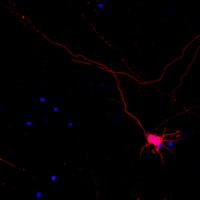Endogenous cholinergic neurotransmission contributes to behavioral sensitization to morphine.
Bajic, D; Soiza-Reilly, M; Spalding, AL; Berde, CB; Commons, KG
PloS one
10
e0117601
2015
Mostra il sommario
Neuroplasticity in the mesolimbic dopaminergic system is critical for behavioral adaptations associated with opioid reward and addiction. These processes may be influenced by cholinergic transmission arising from the laterodorsal tegmental nucleus (LDTg), a main source of acetylcholine to mesolimbic dopaminergic neurons. To examine this possibility we asked if chronic systemic morphine administration affects expression of genes in ventral and ventrolateral periaqueductal gray at the level of the LDTg using rtPCR. Specifically, we examined gene expression changes in the area of interest using Neurotransmitters and Receptors PCR array between chronic morphine and saline control groups. Analysis suggested that chronic morphine administration led to changes in expression of genes associated, in part, with cholinergic neurotransmission. Furthermore, using a quantitative immunofluorescent technique, we found that chronic morphine treatment produced a significant increase in immunolabeling of the cholinergic marker (vesicular acetylcholine transporter) in neurons of the LDTg. Finally, systemic administration of the nonselective and noncompetitive neuronal nicotinic antagonist mecamylamine (0.5 or 2 mg/kg) dose-dependently blocked the expression, and to a lesser extent the development, of locomotor sensitization. The same treatment had no effect on acute morphine antinociception, antinociceptive tolerance or dependence to chronic morphine. Taken together, the results suggest that endogenous nicotinic cholinergic neurotransmission selectively contributes to behavioral sensitization to morphine and this process may, in part, involve cholinergic neurons within the LDTg. | 25647082
 |
Forebrain deletion of the dystonia protein torsinA causes dystonic-like movements and loss of striatal cholinergic neurons.
Pappas, SS; Darr, K; Holley, SM; Cepeda, C; Mabrouk, OS; Wong, JM; LeWitt, TM; Paudel, R; Houlden, H; Kennedy, RT; Levine, MS; Dauer, WT
eLife
4
e08352
2015
Mostra il sommario
Striatal dysfunction plays an important role in dystonia, but the striatal cell types that contribute to abnormal movements are poorly defined. We demonstrate that conditional deletion of the DYT1 dystonia protein torsinA in embryonic progenitors of forebrain cholinergic and GABAergic neurons causes dystonic-like twisting movements that emerge during juvenile CNS maturation. The onset of these movements coincides with selective degeneration of dorsal striatal large cholinergic interneurons (LCI), and surviving LCI exhibit morphological, electrophysiological, and connectivity abnormalities. Consistent with the importance of this LCI pathology, murine dystonic-like movements are reduced significantly with an antimuscarinic agent used clinically, and we identify cholinergic abnormalities in postmortem striatal tissue from DYT1 dystonia patients. These findings demonstrate that dorsal LCI have a unique requirement for torsinA function during striatal maturation, and link abnormalities of these cells to dystonic-like movements in an overtly symptomatic animal model. | 26052670
 |
Adolescent, but not adult, binge ethanol exposure leads to persistent global reductions of choline acetyltransferase expressing neurons in brain.
Vetreno, RP; Broadwater, M; Liu, W; Spear, LP; Crews, FT
PloS one
9
e113421
2014
Mostra il sommario
During the adolescent transition from childhood to adulthood, notable maturational changes occur in brain neurotransmitter systems. The cholinergic system is composed of several distinct nuclei that exert neuromodulatory control over cognition, arousal, and reward. Binge drinking and alcohol abuse are common during this stage, which might alter the developmental trajectory of this system leading to long-term changes in adult neurobiology. In Experiment 1, adolescent intermittent ethanol (AIE; 5.0 g/kg, i.g., 2-day on/2-day off from postnatal day [P] 25 to P55) treatment led to persistent, global reductions of choline acetyltransferase (ChAT) expression. Administration of the Toll-like receptor 4 agonist lipopolysaccharide to young adult rats (P70) produced a reduction in ChAT+IR that mimicked AIE. To determine if the binge ethanol-induced ChAT decline was unique to the adolescent, Experiment 2 examined ChAT+IR in the basal forebrain following adolescent (P28-P48) and adult (P70-P90) binge ethanol exposure. Twenty-five days later, ChAT expression was reduced in adolescent, but not adult, binge ethanol-exposed animals. In Experiment 3, expression of ChAT and vesicular acetylcholine transporter expression was found to be significantly reduced in the alcoholic basal forebrain relative to moderate drinking controls. Together, these data suggest that adolescent binge ethanol decreases adult ChAT expression, possibly through neuroimmune mechanisms, which might impact adult cognition, arousal, or reward sensitivity. | 25405505
 |
A genetically specified connectomics approach applied to long-range feeding regulatory circuits.
Atasoy, D; Betley, JN; Li, WP; Su, HH; Sertel, SM; Scheffer, LK; Simpson, JH; Fetter, RD; Sternson, SM
Nature neuroscience
17
1830-9
2014
Mostra il sommario
Synaptic connectivity and molecular composition provide a blueprint for information processing in neural circuits. Detailed structural analysis of neural circuits requires nanometer resolution, which can be obtained with serial-section electron microscopy. However, this technique remains challenging for reconstructing molecularly defined synapses. We used a genetically encoded synaptic marker for electron microscopy (GESEM) based on intra-vesicular generation of electron-dense labeling in axonal boutons. This approach allowed the identification of synapses from Cre recombinase-expressing or GAL4-expressing neurons in the mouse and fly with excellent preservation of ultrastructure. We applied this tool to visualize long-range connectivity of AGRP and POMC neurons in the mouse, two molecularly defined hypothalamic populations that are important for feeding behavior. Combining selective ultrastructural reconstruction of neuropil with functional and viral circuit mapping, we characterized some basic features of circuit organization for axon projections of these cell types. Our findings demonstrate that GESEM labeling enables long-range connectomics with molecularly defined cell types. | 25362474
 |















